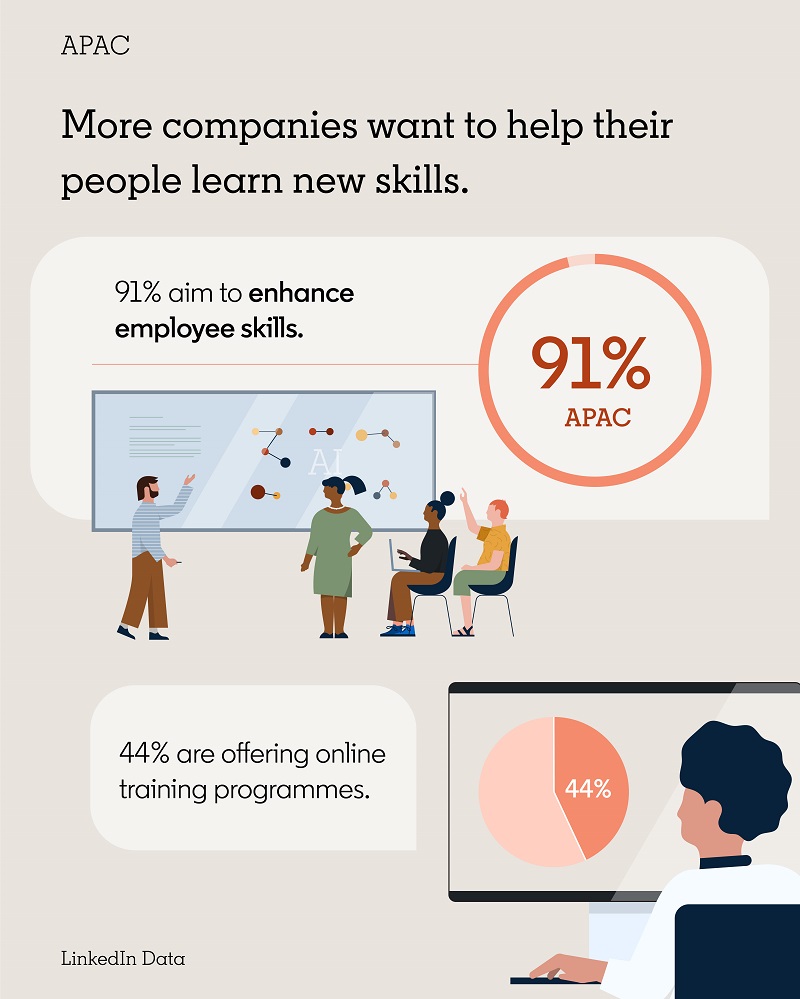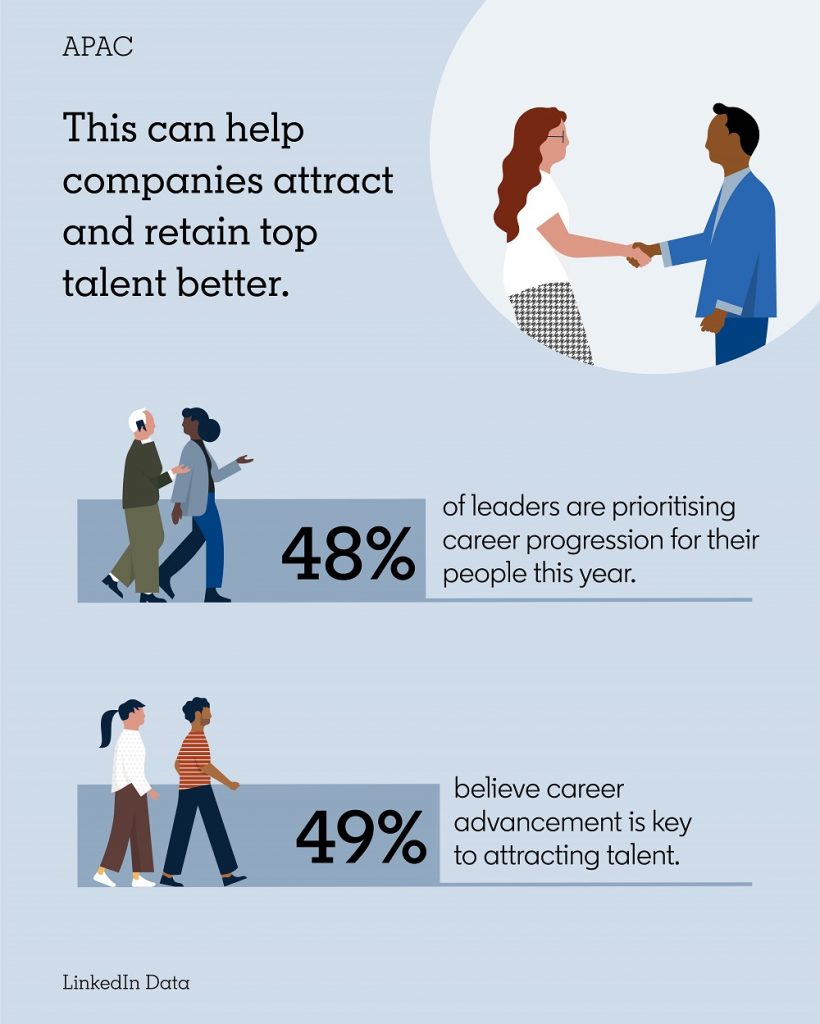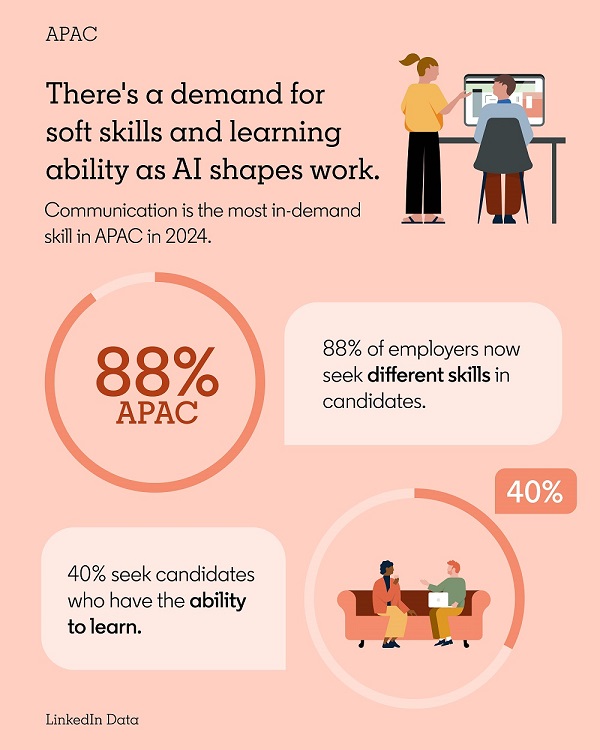With skills needed for a job changing by a staggering 68% by 2030 due to the impact of AI, 91% of companies in the Asia Pacific say they plan to enhance their people’s skills and abilities in the new year.
Today, the top five skills that hiring managers in Asia Pacific consider the most important in the era of AI show are a combination of both hard and soft skills – problem-solving abilities (35%), communications skills (27%), critical thinking (25%), AI skills (19%) and IT & Web skills (17%).
“In the past year, the narrative was dominated by technological advancements, particularly the integration of AI into business workflows. The resulting surge in demand for AI expertise reflected the challenges many businesses faced in navigating this transformative shift and incorporating cutting-edge technologies into their operations,” Feon Ang, vice president at LinkedIn Talent Solutions and managing director for Asia Pacific.
“However, we are now witnessing a pronounced shift towards skills – both technical and soft skills – to thrive in the era of AI. Investing in people’s growth is no longer a perk but a strategic imperative, considering that our workforce is the driving force behind companies’ success in an era shaped by both AI innovation and collaboration with AI.”
Previous LinkedIn research has found that professionals in the Philippines are willing to embrace AI in the workplace. Seven in 10 (70%) Filipino professionals want to learn more about AI, and more than half (55%) already use generative AI in their jobs.
Filipino professionals are optimistic that AI will positively transform their careers, with almost all (97%) saying they are excited to use AI at work and believe it will help them progress (95%).
A staggering 88% of employers in Asia Pacific markets LinkedIn studied have observed substantial changes in the skills and qualifications they prioritize in job candidates due to the pervasive impact of AI and automation in their industries.
Companies are placing emphasis on candidates who possess not only AI expertise but also soft skills and a capacity for learning.

In Southeast Asia (SEA), according to LinkedIn’s latest Workplace Learning Report, an astounding 95% of Learning & Development (L&D) professionals believe that human skills are increasingly becoming the most competitive in our economy.
In particular, “Communication” has topped LinkedIn’s most in-demand skills list across all countries in Asia Pacific – in the Philippines, Australia, China, India, Indonesia, Japan, and Singapore.
This is not surprising in a new world of work where AI tools are freeing time for professionals to excel in jobs only people can do, like building relationships and collaborating with others.
In addition, 40% of Asia Pacific hiring managers consider an individual’s potential for growth and ability to learn the most critical factor when evaluating internal and external candidates.
A large majority of companies in Asia Pacific (91%) are also focused on preparing their employees for the future world of work by enhancing their skills and capabilities, believing that this will lead to increased confidence and job security.
In fact, Asia Pacific HR professionals are offering online training programs (44%), and internal learning and development sessions focused on generative AI (43%) to do so.
As companies increasingly invest in learning opportunities, the focus on creating a learning culture has soared, becoming a top priority for L&D professionals in 2024 across all Asia Pacific markets.
In fact, 91% of them in SEA say they can show business value by helping employees gain skills to move into different internal roles.

A recent survey of Asia Pacific leaders has revealed that internal mobility is becoming an increasingly important factor in attracting and retaining top talent within organizations.
The survey found that 48% of Asia Pacific leaders identified providing career progression opportunities as their key priority this year.
Close to 4 in 10 (37%) of hiring managers see career growth opportunities as key to retaining top talent, along with competitive salary and workplace benefits (39%).
In addition, close to half (49%) of Asia Pacific employers believe that highlighting opportunities for career advancement and increasing internal mobility are the top two ways to attract talent.
These findings suggest that organizations in the Asia Pacific region would do well to focus on internal mobility as a key strategy for attracting and retaining top talent in the years to come.




